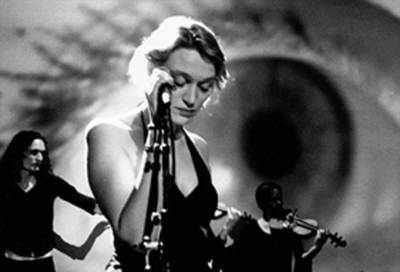
MUSIC/Disc Series
"Everything Nothing"
Iuno
"Love and fear. Everything is about love and fear."
We originally fell in love with each other’s creativity, then with each other. After a year or so, we started writing songs together.
Our first album, “Everyone’s Gone,” is the result of that. Later we started working with other artists on our live shows. These are different artists from show to show. We’ve worked with authors (on the Crossing Borders festival), string players, video artists and moviemakers. Anyone that can contribute something that fits the music is welcome to join the Iuno Laboratory.
Iuno (Juno) is the Roman queen of the gods, wife and sister of Jupiter. We liked her name, and decided that if we ever had children, this would be the name if it were a girl. Since we've been way too busy to have any children, we decided to give the name to our band.
We both do a little bit of everything. Stella’s main part is the lyrics and the melodies, Steven’s main thing is the music.
We’re each others' critic and in that way we both shape what the other has come up with. For us this is a very fruitful way of working that can get very passionate. Passionate in this context means: fighting and making up. Aah...making up.
MUSING
What most inspires us to write: Anything...everything...nothing.
We mostly write at night. The atmosphere of night is more inspiring than that of daytime.
In the daytime there's too much distraction; everything’s realtime and serious, people calling, neighbors stopping by, while at night everyone sleeps, everyone’s gone and time is less of an issue.
A little intoxication, be it a smoke or a drink, can also help while writing a song. It helps to see things in a more forgiving light. It sedates the superego and gives creativity a chance. Being critical is a good thing when producing and perfecting a song, but it can be a bad thing when creating it.

"I hope the lyrics speak for themselves. 'Nothing' is about death. 'Everything' is about life. 'Precious' is about the fear to love. I guess that’s got all the major themes covered."
[Shown above: Stella Bergsma/Photo: Maartje van Caspel]
The song itself, the basic idea, is done within an evening. The finishing up usually takes a little less than a year. The actual writing of the song is the most fun part, because it’s very direct, you're still working at the source.
The completing is the most difficult part. We are both quite perfectionist, so we often listen to a song over and over again and alter it until we’re satisfied with it. When you’ve heard a song a thousand times, it can be quite hard to still maintain an objective view of it. Luckily we are each others' most severe critics.
STRANGE ATTRACTORS
Born/Created
Steven, on whether singers/composers are born or created: Born and created, I would guess. There was only one Mozart, but if his father hadn’t pushed him to be a composer since he was old enough to hold a violin, we might never have heard of him at all.
I think some occurrence in your life has to be pushing you to be an artist. Beyond that, I think the way creativity really works, or where it comes from, is way too complex for us to understand.
Stella: Nature or nurture. Chicken or egg. You can’t really tell. And frankly, I don’t really care, as long as good music is being made.
Life/Art
Steven: Most of our songs are based on feelings, convictions and philosophies, rather than actual incidents. The less specific lyrics are, the more you can put into them.
Stella: That’s true, but sometimes an incident is the inspiration for a song. “The Park” is based upon a panic attack I had in a park, and “Sculpture” is based on a very simple moment of happiness: We were sitting on our couch, looking out of our window. Outside there was a thunderstorm, on our stereo Mahler’s third symphony. The moment was pure beauty.
On what comes first, words or music: It depends. Sometimes Steven has already made music that almost naturally seems to fit to lyrics I wrote. Or the way the music sounds inspires me to write new lyrics. It’s almost organic sometimes. It’s hard to point out who does what and where what begins.
Title/Work
Steven, on which comes first, the title or the work: Usually the song suggests a title. We don’t know up front what we will be writing. When we write a song, it’s a very intuitive process. Having a title in advance would only limit what the song could become.
Stella: Coming up with the title is one of the best parts. It’s like naming a child. I especially like it, and this happens a lot, when Steven makes up the title to a song I wrote the lyrics for. I feel like he really understands me, then.
Personal/Universal
Stella: Since I wrote all the lyrics to the second album, I would say all the songs are equally personal.
On the first album it would be the song “star,” a really short song at the end of the album. It’s about my father, who died seven years ago.
Steven: Ah, the agony...! I cannot choose. I feel I would betray other songs if I chose one. That’s how personal they are.

"Art, if it’s good art, is fighting battles for mankind on the outer edges of our reality. Strangely enough, art is not considered to be that important in our society."
[Shown above: Steven de Munnik, Stella Bergsma/Photo: Maartje van Caspel]
Clarity/Resonance
Steven, on what is more important, philosophical clarity or emotional resonance: Both [are important]. I feel very strongly about philosophical clarity. My philosophy, on the other hand, is quite emotional.
Stella: Or it could just be emotional clarity and philosophical resonance.
Fiction/Real life
Steven: For me there is no difference. Fiction is the version of reality we create ourselves. But so is real life. The difference is a matter of belief, which is a matter of blind choice. I hate blind choices.
Stella: Real life is always stranger.
CLOSER
Stella, on the most insightful thing anyone ever said to her: When I cried out: “Life makes no sense,” a wise man replied: “Indeed, it doesn’t. Don’t you find that extremely comforting?”
After my initial shock I realized that he was right, and since then I always find comfort in the fact that life makes no sense. Because it gave me the answer I was always looking for. Now nothing has to have a meaning anymore. It can just be. I can just be.
Steven, on the most scary thing anyone ever said to him: “Stop smoking. It will kill you. It took me a heart attack to quit. Quit now.” That is what a man at the cigarette counter in the supermarket said to me, when I was buying cigarettes, one day.
I got paranoid, thinking this was my future-me, coming back to warn me. I almost quit.
THEMES: BASIC
Stella: Love and fear. Everything is about love and fear.
THEMES: “EVERYONE GONE”
How we chose the title: The image appealed to us. An empty room, after a party, all the people are gone, smoke is hanging in the air, the person that threw the party is sitting there, staring. Film Noir. It’s how it feels when we’re making music. It’s when we’re in a vacuum, where there are no other people.
It’s also a line from a song on the album. It’s the feeling you have when you are awake at night and everything is quiet. It’s like you are the only one there. The only one awake in the whole wide world.
THEMES: “EVERYTHING NOTHING”
We are both amazed by the fact that we are here, that we are Something instead of Nothing. That fact means everything. Hence “Everything Nothing.”
Or as Blaise Pascal said it: "What is man in nature? Nothing in relation to the infinite, all in relation to nothing, a mean between nothing and everything." ("Pensées").
MUSICAL INTENT
Stella: It would be nice if people took the time to really listen, because our music is not the easiest kind. We try to create atmosphere.
We said to each other when we first started out, that we wanted to make music as if it was the soundtrack to a thriller. And that is what we are still trying to do.
Maybe people will understand us better if they know that. I remember one time someone said to me: “I don’t really like your music. When I listen to it I get that uneasy feeling that someone else is also listening, behind my back.” I thought it was the best compliment anyone ever gave us!
Steven: I think the music should be self-sufficient and self-explanatory. Since music is more direct than language, people should either get the message, or the music just isn’t good enough.
I concede the fact that some music you have to learn to appreciate, but for me, the music we make has to appeal to your most primitive senses: Fear, sorrow, love, anger and bliss.
EXPERIENCE
The ideal situation would be that people experience the same as what we experienced while making the music. But that only happens once in a while.
During the recording of “Everything Nothing,” there was someone we only know through the Internet, that we sent newly written songs to, for an objective view on them.
The reason we valued his opinion, was the fact that he really seemed to understand our music, and still like it. He sometimes, when reviewing our music, actually came up with the exact same images we had in mind while writing it. We were amazed by that.
As for the people that appreciate our music for other reasons: bless them.
INTO THE DARK
Stella: Dark songs make me cheerful, and cheerful songs make me suicidal.
Steven: Cheerful music hurts me in a way that I can’t begin to explain. That’s why I never like to go to supermarkets. The music they play in supermarkets is brain pollution. I think cheerfulness has only one dimension: cheerfulness.
Darkness has many, much more interesting shades, from melancholy to raging anger, to all-consuming fear. Lovely. The only times I like cheerfulness in music, is when it has an edge, when it is used to reveal something darker that lies underneath it.
BASIC NECESSITIES
Stella: Yes, [I do think music is necessary in daily life.] It’s been a part of humanity ever since we could lift a stick and beat a drum.

"Under every definition of language, music is a language...it not only tells you how the composer felt at the time of writing it, it actually lets you feel it for yourself."
[Shown: Stella Bergsma/Photo: Jelle Kalkman]
Music elevates the mind and takes you to a different place. Without this kind of diversion, we would be lost, I’m afraid.
Besides being a diversion, art in general also points us to the most important thing in life, which is not survival or mere perseverance, but creativity, and becoming something we aren’t yet.
Art, if it’s good art, is fighting battles for mankind on the outer edges of our reality.
Strangely enough, art is not considered to be that important in our society.
FRUSTRATIONS
Stella: That I cannot drink and eat whatever the hell I want without gaining weight. And death. Death really pisses me off.
Steven: What really frustrates me is stupidity, the kind of stupidity that hurts other people, or kills other people, especially when combined with misplaced arrogance. Oh, and supermarket music, did I mention supermarket music?
VICE VERSO
Everything and Nothing puzzles us. Since Everything is everything how can there be Nothing?
And can Nothing actually be? Nothing is the negation of all things, which implies it should be something. And if it’s something, how can it be nothing?
Or is it just a language problem? Does the fact that nothing exists as a predicate necessitate that it actually should be something? And how can it be that we don’t know anything about this? How can it be we don’t really know anything about anything? This really eats our brain.
WRITER’S BLOCK
Ehhmm...
INFLUENCES
PJ Harvey, Portishead, Barry Adamson, David Cronenberg, Heidegger, Wittgenstein, Nietschze, Toon Tellegen (maybe they knew everything), Simeon ten Holt (Canto Ostinato), Arvo Pärt, Górecki, Bukowski, Pink Floyd, Björk, Chet Baker, Nick Drake, Radiohead, Ministry, Frank Zappa, Sergio Mendez and Brasil 66, Ella Fitzgerald, to name a few.
Stella, on songs they wish they’d written: “Catherine,” by PJ Harvey. It’s a song about jealousy. It takes guts to write about such a dark feeling. And she does it beautifully. Also “Everything In Its Right Place,” by Radiohead. It’s got everything in its right place.
We're both really into movies. We like scary movies. Psychological thrillers. Lately we’ve been watching a lot of Japanese movies. The image language they use is new and original to us, since we’re used to American and European movies.
Movies are probably one of the best ways to depict the subconscious. The subconscious is probably our biggest source of inspiration. It’s so full of imagery and mystery.
WORDS AND MUSIC
Stella: Music goes straight to your heart and is a universal language. This is a cliché of course. It is true nevertheless. But personally, I love words, I adore words.
I think poetry is the highest art form there is. I cannot really explain it, but a small word like awe totally puts me in awe.
Under every definition of language, music is a language. Since music gets its meaning from our corresponding states of mind, it not only tells you how the composer felt at the time of writing it, it actually lets you feel it for yourself. In that way, it's a hyper-language.
Steven: Equally important. The words become music when you sing them. The music speaks to you in a way that words cannot.
LOST IN TRANSLATION
Stella: Singing is much more difficult for me [than writing]. I love writing a song, but singing it always frustrates me because I can always do better.
Steven: For me, performing it is always a bit tricky. People like to see a direct link between what a musician does on stage, and what they hear. And that’s not always easy when you’re working with computers. This is something I had to learn and at which I’m gradually getting better. This is also why we like to work with live musicians on stage; it adds to the live feel.
INSIDE TRACKS
Steven:
“Precious”
You seem to know everything
but you don’t know faith
To me, this has a lot of meaning, in that it unveils the arrogance of rationality. I think rationality is driven by emotions, something which the greatest philosophers often seemed to forget.
“Nothing,” for me, quite accurately describes nothing.
“You and me”
It’s in the things you say
between your words
They’re true but they’re not
It’s you but it’s not
I know it’s hard to believe
And that’s what makes it true
I’ve stopped listening to you
It’s all about the way you stare at me
I know that you see
Just don’t know who you see
I know it’s hard to believe
That’s just what makes it true
I’ve stopped looking at you
And all that I remember
is your touch
It’s strange isn’t it
It doesn’t seem that much
I know it’s hard to believe
That’s just what makes it true
I’ve forgotten all about you
© 2004 iuno
“You and me” is the coldest love song we [ever] wrote.

Stella :
“Nothing”
It’s a dark place
Only a shadow maybe
It’s a lost time
No time
I am falling
I am coming baby
It’s only nothing
It’s fine
“Everything”
Sun in water
Is liquid diamond
Wind in leaves
Is whispering peace
I can see
Everything is beautiful
but me
“Precious”
Your body that glows and your voice in my ear.
The sweet of your laughter the salt of your tear.
Our window, our music, the sounds that I hear, all that
Makes happiness scarier than fear.
I hope the lyrics speak for themselves. “Nothing” is about death. “Everything” is about life. “Precious” is about the fear to love. I guess that’s got all the major themes covered.
IN PASSING
The most interesting stranger we’ve ever met: An old, Jewish man, with an Auschwitz tattoo on his arm. We never met anyone more understanding and forgiving than him.
PAGES
Stella: I’m reading a book about a woman with a kind of dark side. The back flap said the main character was a cross between Patrick Bateman and Lolita. I thought, wow, a female psycho, that could be interesting! But in fact she talks about cannibalism so much, it's starting to bore me. And of course I always read all the magazines I can get my hands on.
Steven: I’m re-reading “The Elementary Particles” by Michel Houellebecq. It’s one of the best books I’ve read in years.
Other favorite writers of mine are Harmen Lustig and Yorgos Dalman. At the moment they are the most talented Dutch writers, in my opinion.
SOUNDS
Stella: I have an MP3 player and it really brightens up my days. I like to listen to new stuff. Outkast, Amy Winehouse, Jay Z, and The Streets are on there right now. Don’t know if they will stick though.
If I like a song, I tend to play it and sing it over and over again. Steven can get really annoyed by this. One night, when he wasn’t home, I played “Blinded by the Lights” (The Streets), which I think is an absolutely brilliant song, about a hundred times.
Steven: Stella repeating the same song over and over again. And “The Teaches of Peaches,” by Peaches. I really love that album. It’s totally under-produced, which gives it a really raw and direct sound. On top of that, Peaches is cool.
OUTSIDE MUSIC: INTERESTS
Stella: People really interest me. What they do, what they don’t do. And of course why they do or don’t.
Steven: Philosophy. Why everything is, and more to the point: what everything is. There is no answer to be found there, so it’s a great way to let your imagination run wild.
I studied philosophy, but never made it my job, because then I’d have to believe in something, I’d have to be making a point. In my philosophy there are no points to be made. In music I can make a point without being certain of anything. That’s why music will always be more satisfying to me.
QUICK HITS
Interesting fact that nobody knows about us yet:
That we’re that good.
If I wasn’t a singer/composer, I’d definitely be:
Stella: Some other creative thing. I’m not fit for anything else. As a child I always wanted to be an actress. In my fantasy I already have my Oscar acceptance speech written.
Steven: An astronaut, had I pursued my childhood ambitions. I once had a dream, in which I was standing on the surface of the moon, looking at the earth.
It was a wonderful feeling to be that far away from everything. At the same time it was also kind of scary; I didn't know how to get back. Food for psychiatrists, probably.
Life is:
Stella: Yes, it sure is.
Steven: Everything between two nothings.
Favorite quotes:
Steven: "Razors pain you; rivers are damp; acids stain you; and drugs cause cramp. Guns aren't lawful; nooses give; gas smells awful; you might as well live." (Dorothy Parker)
Stella: I love quotes. Probably cause I like words so much. I collect quotes from writers and philosophers and such, and I am totally into movie quotes.
It’s hard to pick one favorite. Different quotes are good for different occasions. I like the really bright and witty ones like the ones from Oscar Wilde and Dorothy Parker. I also like the more serious ones, like Dylan Thomas’ “Rage, rage against the dying of the light.”
But the one I can most subscribe to is a simple one. It’s from St. Augustine.
It says: Ama et fac quod vis; Love and do what you please.
Author/artist bio: Iuno are Stella Bergsma and Steven de Munnik, sometimes assisted on stage by the Iuno Laboratory, an ever-changing collective of musicians, VJs, and multimedia artists.
Iuno was formed in 1999. Their first album is “Everyone’s Gone,” released in 2001. Their latest album, “Everything Nothing” was released this year, on AKH Records.
Visit official site: Iuno
View lyrics: Iuno
[Shown/header image: Stella Bergsma/Photo: Maartje van Caspel]
All photo materials, music and text referenced (c) 2004, Iuno.
All rights reserved. Used with permission.
Read in-depth interviews with other creative artists, in the DEC/JAN issue of "Arte Six."
RELATED EXTRAS: Dylan Thomas
Hear Dylan Thomas read his poem, “Do not go gentle into that good night”. Courtesy of Caedmon, via The Academy of American Poets.
RELATED EXTRAS: Dorothy Parker
Hear Dorothy Parker read her poem, “Résumé”

<< Home